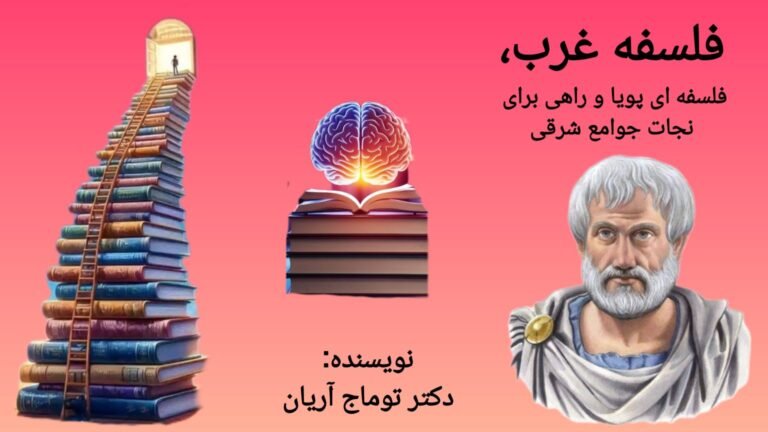Author: Dr. Tomaj Arian*
Western philosophy, and in general philosophy, first emerged in ancient Greece, where thinkers first thought and wrote in a systematic way about society, politics, and earthly phenomena. Before the Greek philosophers, there were almost no written philosophical systems in other civilizations, although the Greeks benefited from the achievements of the Egyptian, Babylonian, and Phoenician civilizations.
The main origin of Western philosophy was Greece, from where it followed its path of development and evolution. Continuing this path, the Roman Empire provided a new platform for the expansion of philosophical thought.
Greece’s island geography led to the development of seafaring and provided extensive contact between the Greeks and other nations. Since Greece did not have sufficient resources for self-sufficiency, it was forced to turn to trade, which led to their economic and intellectual dynamism. While in many Eastern societies self-sufficiency was common and there was no extensive trade; this led to the formation of an introverted, isolationist and somewhat mystical attitude in Eastern culture. In contrast, the spirit of exploration, interaction and learning was strengthened in the West.
Trade opened the Greeks’ horizons and exposed them to diverse societies, cultures, and beliefs. Trade is inherently forward-looking, leading to expansionism and innovation. This same attitude gradually permeated Western philosophy and intellectual structures. This pattern was repeated in subsequent centuries: first in Spain and Portugal in the 16th century, then in Britain in the 17th century. Thus, seafaring and trade played a fundamental role in the formation of Western philosophy and civilization. History has shown that countries built on trade have made great strides in civilization and progress.
The first great Greek philosopher was Thales of Malta. He was a merchant who had acquired empirical knowledge from sea voyages. Thales believed that water was the source of everything, but more importantly, he made a fundamental shift in the way he thought: he abandoned myth and, instead of asking “who” created the world, asked “what” the world was made of.
The first great Greek philosopher was Thales of Malta. He was a merchant who had acquired empirical knowledge from sea voyages. Thales believed that water was the source of everything, but more importantly, he made a fundamental shift in the way he thought: he abandoned myth and, instead of asking “who” created the world, asked “what” the world was made of.
This change in perspective was the beginning of natural philosophy and scientific thinking, and Thales marked the greatest intellectual transformation in the history of human thought.
After Thales, philosophers such as Anaximenes, Anaximander, Heraclitus, Socrates, Plato, Aristotle, Pythagoras, and Epicurus each took steps towards separating thought from religion and a rational understanding of the world. For example, Anaximander believed in a theory similar to evolution, considering humans to be the result of the evolution of marine creatures. From these developments, institutions such as Plato’s Academy and Aristotle’s Lyceum emerged, which played the role of early universities.
These thinkers, through their philosophy, attempted to explain the relationships between man and nature, man and society, and man and government.
The specific geography of Greece and these philosophers gave rise to the concept of democracy, a phenomenon that, 2,500 years ago, seemed like a political miracle.
While in the East, civilizations such as China, Egypt, Iran, and Mesopotamia remained loyal to absolute monarchies and religious rituals, in the West, philosophy became a tool for analyzing human relationships with nature, society, and power.
After a hiatus of several centuries, Western philosophy flourished again in the 16th century. The beginning of this flourishing was accompanied by the Protestant Reformation, which paved the way for fundamental changes in the fields of religion, politics, and science. During this period, philosophers such as Machiavelli, Hobbes, Kant, Locke, Hegel, Rousseau, and Marx and Weber laid the foundations of modernity by analyzing society and politics. Philosophy gradually shifted toward scientism and materialism, and in the light of the Industrial Revolution, it created a new formulation of the world.
Western philosophy was formed on the basis of realism and a view of the material world. The belief that matter exists independently of man has a fundamental place in Western thought. This philosophy seeks to improve human living conditions, relying on reason, experience, and technology. Unlike Eastern philosophy, which is more about resignation to fate and acceptance of suffering, Western philosophy emphasizes change, improvement, and well-being.
Western philosophy focuses on science, health, technology, individualism, and social change. Philosophy in the West has always had a direct connection to the real issues of society and its goal has been to provide practical solutions to human problems.
Western thought believes that man can master nature through knowledge and wisdom and create better conditions for his life. Many of the technologies that serve human comfort today are the result of this view. From food security and health to scientific and industrial advances, all are rooted in a philosophy that considers change to be its essence.
In contrast, many Eastern societies have been prophetic and religiously oriented. The West, while adopting Christianity, adapted it to its own culture. Even the message of Jesus Christ—who rose up against oppression and inequality—inherently emphasized freedom and the improvement of the human condition, which is consistent with Western philosophy.
The philosophical model of the West is a successful experience in analyzing power, society, and government. In order to achieve sustainable development, Eastern societies must benefit from this experience and redefine their mental and social structures. In particular, the Protestant perspective of Christianity, which emphasizes individualism, work, rationalism, and reformability, can be an effective model for static Eastern societies.
Intellectual transformation in the East is not possible without changes in traditional and religious beliefs. What can save these societies from their current situation is the acceptance of Western philosophy and the application of its principles in politics, government, and culture.
End
*Writer, political analyst, PhD in political science

